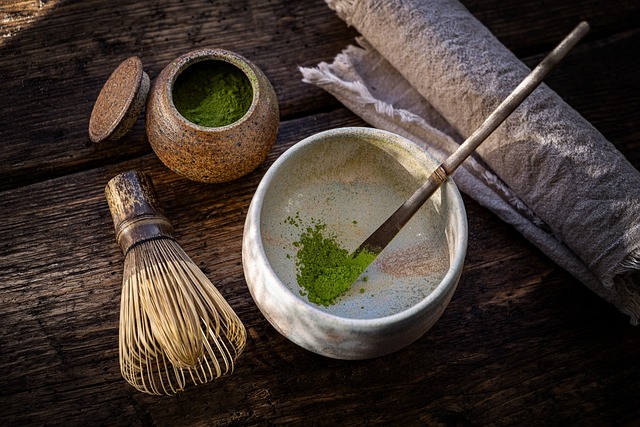Matcha tea can be good for your health, as it’s high in antioxidants and may help heart and brain health. It may also benefit weight loss. Matcha has skyrocketed in popularity lately, with matcha shots, lattes, teas, and even desserts appearing everywhere from health stores to coffee shops.
Matcha, similar to green tea, is derived from the Camellia sinensis plant. Nevertheless, its cultivation process varies and it possesses distinct nutritional features.
To prevent direct sunlight during the plant’s growth phase, farmers cover the tea plants for 20-30 days prior to harvesting matcha. As a result of this technique, the plant produces more chlorophyll, increases the content of amino acids, and obtains a darker green tint.
After the tea leaves are collected, they are processed by discarding the stems and veins and grinding the leaves into a finely ground powder called matcha. Matcha has a higher quantity of caffeine and antioxidants compared to regular green tea because it retains nutrients from the entire tea leaf.
Examining matcha and its constituents has led to the discovery of several advantages, demonstrating its ability to safeguard the liver, encourage cardiovascular well-being, and facilitate weight reduction.
Matcha is ranked equally with other foods known as superfoods, such as turmeric, ginger, kefir, wild blueberries, and mushrooms. Due to its powdered form, it can be seamlessly added to smoothies, beverages, and even baked items.
From iced matcha lattes to macarons and mochi, it’s ubiquitous, especially in sweet drinks like boba and treats such as candy and ice cream. There are those who appreciate the herbaceous taste that matcha provides, while others seek to gain its alleged health advantages.
“What exactly is this well-liked green powder?” As per William Li, MD, who is a physician and food researcher, “Matcha is a distinctive variant of green tea and is believed to contain more polyphenols than the regular green tea. The antioxidants present in matcha have numerous health advantages such as elevated metabolism, reduced cholesterol, and better blood circulation.”
Matcha tea, which shares its origin with green tea, can be traced back to Japan around a thousand years ago. Although both beverages are derived from the Camellia sinensis plant, matcha and green tea are obtained through distinctive processes, which may account for the former’s potential superiority.
A recent review in the 2021 Molecules issue has revealed that shielding the tea plant from direct sunlight is a crucial step in producing Japanese matcha, as it boosts the levels of chlorophyll, caffeine, amino acids, and antioxidants in the final product.
Matcha is primarily recognized for its rich antioxidant content, fresh scent, and deep green hue. While green teas feature the antioxidants epicatechin (EC), epigallocatechin (EGC), and epicatechin gallate (ECG), the review highlights that matcha stands out due to its high concentration of epigallocatechin gallate (EGCG).
“Due to their exceptionally high concentration of catechins, matcha and green tea have been shown to support everything from digestion to heart health to metabolism, cognitive function, cancer prevention, and more,” says Jenna Volpe, RDN, who’s based in Austin, Texas.
If you want to give matcha a chance, you don’t need to purchase pricey treats or Instagrammable drinks at your local coffee shop (though that can be fun, too). Keep things simple by making matcha at home — just whisk the vibrant power into your liquid of choice.
All these health benefits of matcha tea are supported by scientific evidence and are listed as the most significant ones.
1. Boost energy levels
Liquid energy sources such as coffee and energy drinks are often consumed by many American adults in the morning and afternoon, possibly due to the CDC’s estimation that over 33% of them are sleep deprived.
While energy drinks are becoming more popular, coffee remains a favorite for around 62 percent of Americans as reported by the National Coffee Association. However, there’s also another option for caffeine that is worth including in your routine: matcha.
Matcha contains a higher amount of caffeine than coffee, green tea, or black tea, as noted by the Cleveland Clinic. The quantity of caffeine present in matcha can differ, but the Molecules paper’s writers indicate it ranges from 18.9 to 44.4 milligrams (mg) per gram of matcha powder.
According to Volpe, a single cup of matcha made using matcha powder and water, measuring 8 ounces (oz), has a caffeine content ranging from 76-180 mg. This contrasts with an equivalent sized cup of black or green tea, which typically contains 30-50 mg, and coffee, as identified by the U.S. Food and Drug Administration (FDA), which contains anywhere from 80-100 mg.
Volpe advises against everyone increasing their caffeine intake as some people may experience symptoms of IBS, IBD, anxiety or insomnia from consuming matcha which contains caffeine. Matcha can be a good source of caffeine for those who aren’t sensitive to it, but it’s important to consume it in the morning instead of the afternoon or evening to avoid disrupting one’s sleep.
The National Sleep Foundation recommends that you refrain from consuming caffeine for at least eight hours prior to going to bed.
2. Support a healthy weight and metabolism
If shedding some extra pounds is your goal, it is important to consider your beverage choices. Previous studies have shown why sugary drinks should be avoided, but what alternatives exist, particularly if water is not appealing to you?
As it turns out, matcha is potentially beneficial for weight loss, and could even aid in treating metabolic disorders and reducing obesity, according to a recent animal study published in Frontiers in Nutrition. Though further human studies are still required to confirm these findings.
Li states that additional research indicates matcha could have the ability to burn fat.
According to William Li, MD, a study published in the International Journal of Sport Nutrition and Exercise Metabolism in September 2018 revealed that consumption of matcha prior to using a treadmill for exercise led to a 35% increase in whole body fat oxidation, which is an indicator of metabolism. The study involved females aged 19-35 who had a normal healthy weight.
In essence, matcha prompts the body to break down fatty acids while working out, resulting in decreased body fat.
A small observational trial published in the September 2022 edition of Plant Foods for Human Nutrition demonstrated that matcha, when consumed alongside a low-calorie diet, may aid in reducing body weight. Participants adhered to a low-calorie diet while taking matcha, leading to this conclusion.
Although the matcha group demonstrated a noteworthy decrease in body weight, the control group exhibited a similar result. Therefore, although matcha might be connected to weight loss, there are additional factors at work.
The presence of catechins in matcha, a type of tea, provides a high level of natural antioxidants. These antioxidants are essential in preventing the harmful effects of free radicals, compounds known for damaging cells and leading to chronic diseases.
By incorporating matcha powder into hot water to create tea, you are able to retain all the nutrients from the entirety of the leaf, resulting in a brew that is generally richer in catechins and antioxidants than tea that has been steeped using traditional green tea leaves.
According to an estimation, matcha contains a significantly greater amount of particular catechins up to 137 times more compared to other green teas. A research conducted on mice demonstrated that matcha supplementation lowered free radical-induced damage and improved antioxidant activity.
The addition of matcha to your diet has the potential to boost your consumption of antioxidants, thereby reducing the likelihood of cell damage and reducing the risk of many long-term illnesses. With its concentrated levels of antioxidants, matcha has the ability to decrease cell damage and safeguard against chronic diseases.
Maintaining good health requires the proper functioning of the liver, as it is responsible for detoxification, drug metabolism, and nutrient processing. According to research, matcha may offer benefits in safeguarding the liver’s well-being. In an experiment, matcha was administered to diabetic rats for a duration of 16 weeks, and results demonstrated that it aided in shielding both the kidneys and liver from harm.
In a different experiment, 80 individuals with nonalcoholic fatty liver disease were administered either a placebo or a daily dose of 500 mg green tea extract for 90 days. The results indicated that green tea extract effectively decreased levels of liver enzymes, which are indicative of liver damage.
In addition, a review of 15 studies indicated that the consumption of green tea was linked to a reduced likelihood of developing liver diseases. It is crucial to bear in mind that there may be other variables contributing to this correlation.
Further investigation is necessary to analyze the impact of matcha on the wider population, given that a majority of the studies conducted have only focused on the effects of green tea extract on animals.
Several studies indicate that matcha has the potential to prevent liver damage and lower the likelihood of liver disease, but further research is necessary to assess its impact on the general population.
Liver health can be adversely affected by factors related to one’s lifestyle apart from alcohol and drugs. Nonalcoholic fatty liver disease, which results from fat buildup in the liver, is a prevalent liver condition. Although the cause is at times unknown, it has been associated with obesity, elevated blood sugar, and insulin insensitivity, as per the Mayo Clinic. Matcha consumption may aid in this case, but research in this area is restricted.
A study conducted on obese mice, which was published in the Nutrients journal in June 2021, found that the mice that were given matcha experienced enhanced liver function and a decrease in nonalcoholic fatty liver disease.
Matcha’s catechins, particularly EGCG, may provide benefits to those with nonalcoholic fatty liver disease, though further studies involving human participants are necessary. The March 2022 edition of Medicines reported on a review indicating that EGCG possesses advantageous properties in combating inflammation triggered by oxidative stress that can lead to liver disease.
According to some studies, certain elements found in matcha may have the potential to improve brain functionality. For instance, a study conducted on 23 individuals analyzed their performance on cognitive tasks aimed at gauging brain performance.
The study involved some subjects who drank matcha tea or ate a bar with 4 grams of matcha, while the control group consumed either placebo tea or bar. As per the research, matcha demonstrated enhancements in memory, reaction time, and attention, compared to the placebo.
A different study revealed that the cognitive abilities of elderly individuals were enhanced through a daily intake of 2 grams of green tea powder for a period of 2 months. Furthermore, matcha comprises a denser dose of caffeine compared to green tea, containing 35 milligrams of caffeine in half a teaspoon (which is roughly 1 gram) of matcha powder.
Several research works have established a connection between the intake of caffeine and advancements in cognitive function, highlighting quicker response times, heightened focus, and improved recollection. In addition, Matcha comprises L-theanine, a component that modifies the influence of caffeine by supporting vigilance and preventing the energy slumps that can result from consuming caffeine.
Increasing alpha wave activity in the brain, L-theanine has the potential to reduce stress levels and induce relaxation. Meanwhile, Matcha has been demonstrated to enhance memory, attention, and reaction times – in part thanks to its combination of caffeine and L-theanine, which can improve various aspects of brain function.
With a wealth of health-promoting substances, Matcha is known to contain compounds that have been connected to possible cancer prevention in test tube and animal trial research. In a certain examination, rats that were given green tea extract experienced a decrease in tumor size and a notable deceleration in the breast cancer cell growth.
Matcha, a variety of green tea, contains high levels of epigallocatechin-3-gallate (EGCG), a catechin with potent anti-cancer qualities. According to a tube-test study, the EGCG content in matcha was effective in eliminating prostate cancer cells.
Previous studies conducted on test tubes have suggested that EGCG can combat skin, lung, and liver cancer. It’s necessary to acknowledge that these studies were limited to testing on animals and specific compounds found in matcha. Therefore, additional investigation is required to ascertain the applicability of these findings to humans.
Research in both test tubes and animals has revealed that the substances present in matcha possess the capability to restrain the development of cancer cells.
Accounting for around one-third of all deaths in individuals aged 35 and above worldwide, heart disease is the primary cause of death. Recent research suggests that incorporating green tea into one’s diet can potentially reduce the risk of heart disease as it shares a similar nutrient composition with matcha.
Studies have demonstrated that green tea can lower the levels of total cholesterol and harmful LDL cholesterol, as well as triglycerides. Moreover, it might have the ability to prevent the oxidation of LDL cholesterol, which could provide further defense against heart disease.
Studies that involved observation revealed that the consumption of green tea is linked to a lower likelihood of experiencing heart disease or stroke. Including matcha drinking in your regime, along with a balanced meal and active routine, could promote cardiovascular health and act as a safeguard against illnesses.
Research demonstrates that green tea and matcha can reduce various risk factors associated with heart disease.
Additional remarks.
Although it originates from the same plant as green tea, matcha is prepared using the whole leaf, making it rich in antioxidants and other important plant compounds. Research has shown that matcha and its constituents offer a range of health advantages, such as promoting weight loss and reducing the likelihood of heart disease.
The tea is easy to make, allowing you to easily add it to your daily routine for an extra burst of deliciousness.



